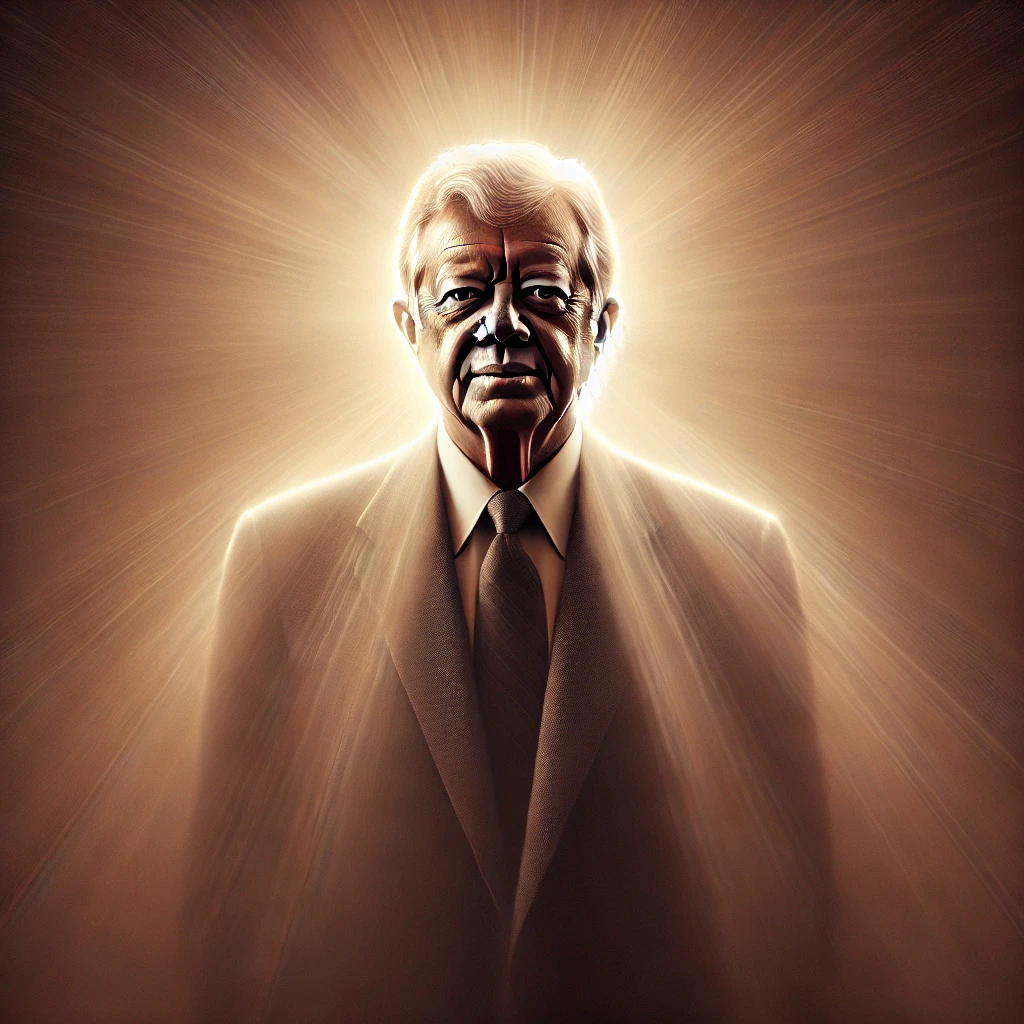Jimmy Carter, the 39th President of the United States, was a remarkable figure whose life of service spanned nearly a century. Born on October 1, 1924, in Plains, Georgia, James Earl Carter Jr. grew up in a modest farming family. Despite humble beginnings, Carter’s curiosity and dedication to learning set him on a path to national and international prominence. His accomplishments, both in and out of public office, reflect a commitment to human rights, diplomacy, and service to humanity.
Carter's early years were defined by perseverance and an insatiable thirst for knowledge. He attended the United States Naval Academy, where he graduated in 1946, embarking on a career in the Navy. Specializing in submarines, he quickly demonstrated his intellect and leadership capabilities. Carter’s naval career included work on the cutting-edge development of nuclear-powered submarines, a testament to his technical expertise and dedication to innovation. His tenure in the Navy instilled discipline, focus, and a sense of responsibility that would characterize his later endeavors.
After leaving the Navy, Carter returned to Plains to manage the family’s peanut business, transforming it into a profitable enterprise. But his ambition extended beyond the confines of business. Deeply influenced by his Christian faith and a commitment to social justice, Carter entered politics to bring about meaningful change. He served two terms in the Georgia State Senate before becoming the state’s governor in 1971. As governor, Carter took bold stands against racial segregation and championed reforms to modernize Georgia’s government, prioritizing efficiency and equity.
In 1976, Jimmy Carter launched a presidential campaign that emphasized honesty, transparency, and a return to morality in government—values that resonated deeply with a nation disillusioned by the Watergate scandal. Carter’s grassroots approach and focus on human rights won him the presidency, making him the first U.S. president from the Deep South since Reconstruction. His presidency, from 1977 to 1981, was marked by a mix of groundbreaking achievements and formidable challenges.
One of Carter’s most enduring legacies as president was his dedication to peace and diplomacy. He brokered the historic Camp David Accords in 1978, facilitating a peace agreement between Egypt and Israel. This landmark achievement earned widespread acclaim and underscored Carter’s skill as a mediator. He also established the Department of Energy and Department of Education, recognizing the need for strategic national investments in energy independence and educational excellence. Additionally, Carter’s administration emphasized environmental conservation, expanding national parks and preserving millions of acres of Alaskan wilderness.
However, Carter’s presidency was not without struggles. The Iran hostage crisis, coupled with economic challenges such as inflation and high unemployment, tested his leadership and contributed to his defeat in the 1980 election. Despite leaving office after one term, Carter’s post-presidential career would redefine what it means to be a former president and earn him widespread admiration.
After his presidency, Jimmy Carter became a global humanitarian, dedicating the rest of his life to promoting peace, democracy, and human rights. In 1982, he founded the Carter Center, an organization committed to advancing democracy, fighting disease, and resolving conflicts worldwide. Through the Center, Carter played a pivotal role in eradicating Guinea worm disease, reducing cases from millions to mere dozens. This achievement stands as one of the greatest public health victories of modern times.
Carter also became a tireless advocate for free and fair elections, monitoring electoral processes in over 100 countries. His presence as an election observer symbolized integrity and impartiality, often ensuring that fledgling democracies could gain legitimacy. He worked to mediate conflicts in some of the world’s most troubled regions, earning respect as a trusted negotiator who sought justice above all else.
In addition to his humanitarian work, Carter was a prolific author, writing more than 30 books on topics ranging from faith to politics to his own life experiences. His writings reflected a thoughtful, reflective mind committed to understanding the human condition. His book *A Full Life: Reflections at Ninety* offers a deeply personal look at his journey and the principles that guided him.
Jimmy Carter’s humility and steadfast dedication to service extended to his personal life. A devout Christian, he taught Sunday school well into his 90s, inspiring countless individuals with his wisdom and compassion. His marriage to Rosalynn Carter, spanning over 75 years, was a testament to love, partnership, and mutual support. Together, they worked on numerous initiatives to improve lives, from building homes with Habitat for Humanity to championing mental health awareness.
Carter’s centennial life was a testament to the power of perseverance, empathy, and moral courage. His passing at the age of 100 marks the end of an era, but his legacy will continue to inspire generations. From the fields of rural Georgia to the world stage, Jimmy Carter demonstrated that true leadership is rooted in service to others. His work for peace, equality, and human dignity has left an indelible mark on history, ensuring that his memory will be cherished for years to come.
As we reflect on his extraordinary life, Jimmy Carter’s journey reminds us of the profound impact that one individual, driven by compassion and conviction, can have on the world. In honoring his memory, we are reminded to strive for justice, uphold human rights, and dedicate ourselves to the betterment of humanity. Jimmy Carter was more than a president—he was a beacon of hope and a champion of the human spirit.
